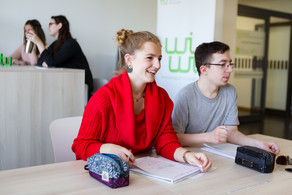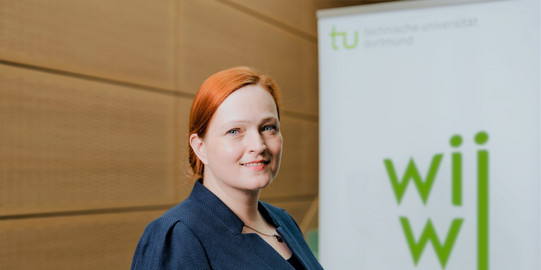FAQ - Frequently asked questions
A semester abroad involves a lot of organization and planning and therefore also a lot of questions. Answers to some of the most frequently asked questions can be found here.

Academic calendar, certificates and exams
The start date is usually the first day of the lecture period or the first day of the intensive German course, if you are attending one. The last day is usually the day of the last exam you take here.
The exam dates are usually set around the middle of the semester.
There are two exam phases at our department. The first exam phase takes place in the first three weeks after the end of the lecture period. Oral examinations can be scheduled up to four weeks after the end of the lecture period, but it is usually not a problem to schedule them in the first three weeks. As the exact exam dates are usually not fixed until around the middle of the semester, we recommend scheduling the last day three weeks after the end of the lecture period.
The second examination phase takes place in the last two weeks of the semester and the first week of the new semester. Exchange students usually only take the first exam period, but can also take the second exam period.
There are two exam phases at our department. The first examination phase takes place in the first three weeks after the end of the lecture period. Oral examinations can be scheduled up to four weeks after the end of the lecture period, but it is usually not a problem to schedule them in the first three weeks. The examination dates are usually set around the middle of the semester.
The second examination phase takes place in the last two weeks of the semester and the first week of the new semester. Exchange students usually only take the first exam period, but can also take the second exam period.
You can find the university's academic calendar here.
Both certificates are issued by the International Office. You can find more information on this in the checklists that you can obtain from the International Office. If you have any questions, please contact the Coordination Office for Erasmus exchange students at TU Dortmund University.
As soon as the Erasmus Coordination of the Departmentof Business and Economics has received all the examination results and grades of an exchange student, the Transcript of Records will be issued. Students then receive a preliminary draft which they can check for completeness. After re-registration or after a period of ten days, the Transcript of Records is then issued and sent by e-mail to the student and the Erasmus Coordination of the respective home university.
Language courses can be included in the Transcript of Records if the final certificate of the course (with grade and ECTS credits) is sent to the department's Erasmus Coordination.
Learning Agreement
Receiving Administrative Contact Person (Administrative contact at the host university)
The contact details for this can be found in the Erasmus Data Sheet of TU Dortmund University, which is linked on the pages of the International Office. You can find it there under Downloads.
Receiving Responsible Person (contact person at the host university)
This is the Erasmus Coordination of the Department of Business and Economics:
Dr. Debra Hanning
Departmental Erasmus Coordinator
Department of Business and Economics
TU Dortmund University
Friedrich-Wöhler-Weg 6
44227 Dortmund
Germany
Phone: +49 231 755-5278
Our courses do not use a component code, but have module titels.
For the Online Learning Agreement, the code 11xxxx can be used for all courses.
Yes, in general this is possible. However, at least 50% of your courses must be from our department. Also, this is dependent on the availability of spaces and the agreement of the lecturer of the course you wish to choose. For a list of courses from other departments check the list put together by the International Office.
Requests for courses from other faculties must be discussed in advance with the Erasmus coordinator.
Please note: Questions about examinations and examination dates for courses from other departments must be discussed with the coordinators and lecturers of the respective department/course. The examination dates of the individual departments are planned separately and an overlap cannot be ruled out.
In most cases, Learning Agreements are created online. Incoming students receive these links or Learning Agreement templates as PDFs from their university.
Link to the Online-Learning Agreement
If required, you can also use a PDF-template for the Learning Agreement from us.
Some general information about Learning Agreements can be found here on the pages for our outgoing students pages for our outgoings students.
It is not necessary for the Learning Agreement to be signed by all parties in order to register at TU Dortmund University; a draft of the Learning Agreement is sufficient for us to see the desired course selection.
Erasmus students can of course also take part in seminars. However, we cannot guarantee participation in advance, as the number of places for seminars is limited. These places are usually allocated towards the end of lectures in the previous semester. If you would like to take part in a seminar, please let us know and we will inform you about the application procedure. We will then be able to let you know before your stay whether you have been allocated a place.
The application phase for the seminars usually takes place in February or July/August. The seminar cannot be included in the Online Learning Agreement before the seminar place has been confirmed. The following procedures are possible:
- the seminar is not initially included in the Learning Agreement and is added later under “changes during mobility”.
- we wait until you have been accepted for the seminar before signing the Learning Agreement.
- the Learning Agreement can be signed as a PDF with the note that we cannot confirm participation in the seminar before a successful application.
Sometimes, a course choice you made before coming does not work out - maybe the course is cancelled, is simply not what you thought it would be or you would rather change to a different course that better reflects your interests. No problem! Simply contact us, letting us know which course you would like to change. If you can switch to that course, you can fill in Table A2 in your learning agreement in the section "During the mobility". We will then sign this for you. Do not forget to also check with your home university.
The course list for the new academic year is generally published in the second half of the previous semester. However, most courses will generally be offered every semester, so you can check for potential courses using the list from a previous winter or summer semester.
Courses (lectures, exercises and seminars)
An overview of our courses held in English can be found here for the winter semester and here for the summer semester. There you will also find a link to the module handbooks for the Bachelor's and Master's degree programs, as well as an overview of the English-language courses offered by our department.
If you need a course description for your university, you can use the module handbook as an official course overview. This is only available in German, but the course descriptions for courses held in English are written in English.
Further information can sometimes be found on the websites of the professorships in the teaching section. Links to the respective courses can be found on the course overview pages ( winter semester and summer semester.
The majority of our courses are offered either as lectures and exercises or as seminars. The following is a rough description of these types of course. The actual form of the course may differ in individual cases.
Lectures and exercises are normally offered together. This is usually 4 hours per week, with a 2-hour lecture and a 2-hour tutorial. The hours are academic hours (i.e. 45 minutes). Lectures and exercises are therefore usually 90 minutes each. When attending the course, students should attend both the lecture and the exercise.
Lectures usually take the form of presentations by professors, during which students can also ask questions. This is usually supplemented by recommended literature and supplementary materials that students go through independently.
Exercises are similar to lectures, but the main focus here is on students actively and independently engaging with what they have learned. Exercises are often taught by research assistants from the respective professorships.
Courses that are offered as lectures and tutorials generally end with a written examination.
In seminars, students apply scientific working methods to prepare a term paper and/or a presentation. Students often work in groups on a specific topic. Meetings can take place weekly or on specific, predetermined dates. As the number of places in seminars is limited, it is essential to apply for a place.
This depends on the type of course you are interested in.
Seminars
You must apply for seminars. The application periods usually take place in January/February for the summer semester and in June for the winter semester. If you are interested in a seminar, you will be informed of this when your Learning Agreement is discussed.
Exchange students regularly apply for a place in a seminar together with other students. In most cases, exchange students will be offered a place in the seminar they apply for, but we cannot guarantee a place in a seminar.
Seminars can only be included in Online Learning Agreements once a successful application for a seminar place has been submitted. They may be included in PDF Learning Agreements with a note that the place cannot be guaranteed. Please contact us about this.
If you require a signed learning agreement before a seminar place is allocated, either fewer courses can initially be included in the agreement or other, non-application courses can be included as an alternative. The seminars can then be added under "changes during the mobility" after a successful application.
Lectures and exercises
You only need to register for lectures and exercises if places are limited. This is the case, for example, if group work is planned or the events take place in computer rooms. If an application is required for a lecture, this will be indicated on the course website on the professorship's pages. If your application is successful, you will receive an offer of a place. By accepting this, you fulfill the requirement for registration. If one of your courses requires an application, you will be informed of this when the Learning Agreement is drawn up.
For most lectures and exercises, you do not need to register separately. You can simply attend the first course (usually in the first week of lectures). Registration is then required later for the examination in the respective course. There are additional requirements for some courses - for example, you may be asked to email the lecturer. This is usually stated on the course pages. You will find these linked on our overview - for the winter or summer semester.
You must register for the exam in courses that are offered as lectures and exercises. You can do this via our website and will also receive an email about this around the middle of the semester.
Registration via the LSF does not take place at our department.
A Moodle room is used in many courses. You will also find links to this on the pages of the professorships for the individual courses, or will be referred to it in the first lecture. You can access the pages of the professorships for English-language courses via the links on the course offerings pages (winter or summer semester) or here via the overview of our professorships and teaching areas.
This may be different for courses at other departments. This will be discussed when you specify these courses in your Learning Agreement.
Seminars have a limited amount of spaces available. They frequently involve group work and are usually graded through writing papers and presentations rather than exams.
International exchange students can apply for these courses at the same time as regular TU Dortmund students do.
Application times are usually in early July for the following winter semester and mid-to late January for the summer semester. You can find an overview of the timeline and the seminars on offer on our website.
For an overview of seminars offered in English, we recommend using the overview page for courses offered in English.
While we cannot guarantee a space in seminars, we can generally offer students their desired seminars. However, they can only be added to the learning agreement after successful application.
To apply for a seminar:
- Fill in an application form for each seminar. You can download this here and will also be sent one in the week before the application period. Some seminars may require a longer online application – if so, you will be informed beforehand.
- Write a short motivational statement in why you would like to join the seminar (one short paragraph only, no more than half a page at most)
- Include a short CV
- Include a transcript of records if possible – otherwise include a list of subjects you have already completed you feel relevant to the seminar.
Please note that your chances of receiving a seminar space will relate to how well the steps mentioned above are carried out. Incomplete applications, mistakes in the motivational statement and similar issues can lower the chances for successful application.
For every seminar you wish to apply for, hand in a PDF document that:
- Includes the form and, if possible, a CV, transcript of records and motivational letter
- Is named as follows: “Lastname Application Seminarname”, for example, "Jones Application Women and Business".
You can send the PDF file to erasmus.wiwitu-dortmundde before the end of the application period.
If your application was successful, you will usually receive a space offer within a few weeks after the deadline. If you do not hear back, it is likely that the application was not successful. You can contact erasmus.wiwitu-dortmundde with any questions.
We have put together a guide to putting together your timetable for the semester here.
You can also find information on dates and venues on the pages of the professorships for the individual courses. You can access the pages of the professorships for English-language courses via the links on the course offerings pages(winter or summer semester) or here via the overview of our professorships and teaching areas.
Yes, you can, provided the lecturers agree. However, it is important to remember that these courses are aimed towards master's students and will thus presume prior understanding and knowledge of methods. We recommend only choosing master's courses if you have already completed some bachelor's courses on that topic previously.
Yes, there are several language courses on offer at TU Dortmund University. Ther is also a 4-week German Intensive Course specifically offered for exchange students in September and March. These courses are free and open to all students, including exchange students. For more information you can check the information provided by the International Office.
Please note that apart from the Intensive German Course for international students, we cannot include any language courses in the Learning Agreement. However, they can be entered in the Transcript of Records.
Yes, this is possible. The same limitations for master's courses and seminars as for courses held in English apply. A language level of at least B2 is recommended. You can find a list of courses offered in the module handbooks for bachelor's and master's courses.
Yes, this is possible. The same restrictions apply here as for Erasmus students of our faculty - we cannot guarantee participation in seminars and courses with limited participation. Please always send a request to the Erasmus coordinator.
You can subscribe to a mailing list for exam-related information here. On this page you will also find all relevant information on examination periods and registration.
If you have any further questions regarding academic issues (such as learning agreements), please feel free to contact the Department Erasmus Coordinator Dr. Debra Hanning. For administrative questions, please contact the International Office.









